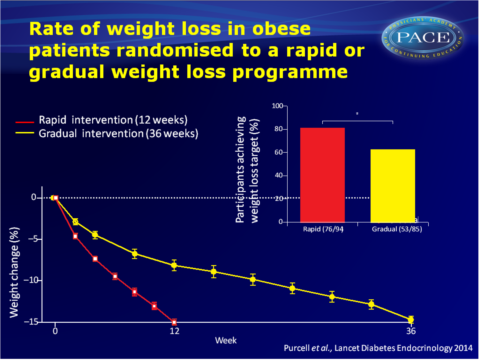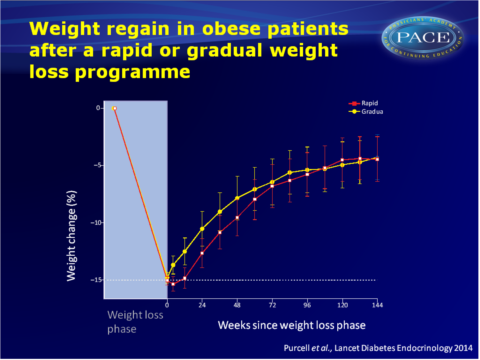RCT refutes common believe that gradual weight loss has longer lasting effect than crash diet
Regain of lost weight was similar in obese individuals randomised to a rapid or a gradual weight loss intervention. More participants in the rapid weight loss programme achieved weight loss of 12.5%.
Literature - Purcell et al., Lancet Diabetes & Endocrinology 2014
The effect of rate of weight loss on long-term weight management: a randomised controlled trial
Katrina Purcell, Priya Sumithran, Luke A Prendergast, et al.
The Lancet Diabetes & Endocrinology, Early Online Publication, 16 October 2014
doi:10.1016/S2213-8587(14)70200-1
Background
The increasing prevalence of obesity now poses a major health problem in both low-income and high-income countries [1]. Dietary weight loss is generally not maintained on the long run [2,3]. Although it is unclear what is the best method to achieve and maintain weight loss, international guidelines recommend gradual weight loss for the treatment of obesity [4-6]. This most likely reflects the belief that gradual weight loss allows more time to change the bad social habits that often underlie obesity.This widespread believe in the superiority of gradual over rapid weight loss has recently been challenged [7,8], and scientific evidence does not support this superiority of a gradual approach [9]. This study aimed to investigate whether the rate of weight loss affects the rate of weight regain in a two-phase, randomised, dietary intervention trial. Also, it was studied whether weight loss-induced changes in circulating appetite-mediating hormones and subjective appetite are affected by the rate of weight loss. In phase 1, 200 obese individuals (BMI: 30.0-45.0 kg/m2) were randomised to either a rapid (12 weeks) or a gradual (36 weeks) weight loss programme, aiming to loose 15% of weight. In phase 2, patients were instructed to follow an individualised diet for weight maintenance for 144 weeks, and had regular individual sessions with a dietician.
Main results
- 179 (89.5%) participants completed phase 1. Individuals more often discontinued the gradual (n=18, 18%) than the rapid (n=3, 3%) weight loss programme.
- 76 out of 94 (81%) who completed phase 1 in the rapid programme achieved 12.5%, as compared to 53 out of 85 (62%) in de gradual weight loss programme (P=0.009).
- By week 144 of phase 2, participants in the gradual programme had regained on average 10.4 kg (95%CI: 8.4-12.4, 71.2% (58.1-84.3) of lost weight regained) while participants in the rapid weight loss group regained on average 10.3 kg (8.5-12.1, 70.5% (57.8-83.2) of lost weight regained).
- 3-β-hydroxybutyrate (related to ketone concentration in blood, suppressing appetite) was measured at 5% and 10% weight loss during phase 1, and found to be significantly higher in the rapid weight loss group than in the gradual programme, while no significant difference was seen at the end of phase 1.
- Leptin levels reduced more with rapid weight loss than gradual weight loss in phase 1. Leptin concentrations increased in both groups in phase 2. Leptin levels did not differ from baseline in either group at week 48, but they were significantly increased at week 144 in both groups.
Irrespective of initial rate of weight loss, participants who regained at least 75% of lost weight by week 144 (n=45) showed large increases in leptin above baseline concentrations. - Mean fasting ghrelin concentrations increased after weight loss and remained high during phase 2, without significant differences between the two weight loss programmes.
- Hunger ratings did not increase during phase 1 in either group, while at weeks 48 and 144 of phase 2 it increased significantly in rapid weight loss participants.
Download Purcell TLDE 2014 PACE.pptx


Conclusion
This randomised study shows that, contrary to a widely-held belief, weight regain does not occur quicker after rapid weight loss. Regain of lost weight was similar in a rapid and a gradual weight loss intervention. Achievement of a weight loss target of 12.5% was more likely in a rapid weight loss programme, and fewer individual withdrew from a rapid as compared to a gradual weight loss programme. Hormonal measurements confirm that physiological adaptations to weight loss are long lasting and suggest that a strategy to suppress hunger after weight loss and therefore to prevent weight regain may be useful.Find this article online
References
1 Adams K, Schatzkin A, Harris T, et al. Overweight, obesity, and mortality in a large prospective cohort of persons 50 to 71 years old. N Engl J Med 2006; 355: 763–78.
2 Glenny AM, O’Meara S, Melville A, Sheldon TA, Wilson C. The treatment and prevention of obesity: a systematic review of the literature. Int J Obesity 1997; 21: 715–37.
3 Ayyad C, Andersen T. Long-term effi cacy of dietary treatment of obesity: a systematic review of studies published between 1931 and 1999. Obes Rev 2000; 1: 113–19.
4 NICE. Obesity: Guidance on the prevention, identifi cation, assessment and management of overweight and obesity in adults and children. Dec, 2006. http://www.nice.org.uk/guidance/cg43 (accessed Sept 16, 2014).
5 Dietitians Association of Australia. The best practice guidelines for the treatment of overweight and obesity in adults. 2005. http:// dmsweb.daa.asn.au/fi les/DINER/Obesity%20Guidelines%20 (Final).pdf (accessed Aug 4, 2014).
6 Pi-Sunyer X, Becker D, Bouchard C, et al. Clinical guidelines on the identifi cation, evaluation, and treatment of overweight and obesity in adults: executive summary. Expert Panel on the Identifi cation, Evaluation, and Treatment of Overweight in Adults. Am J Clin Nutr 1998; 68: 899–917.
7 Casazza K, Fontaine K, Astrup A, et al. Myths, presumptions, and facts about obesity. N Engl J Med 2013; 368: 446–54.
8 Casazza K, Brown A, Astrup A, et al. Weighing the evidence of common beliefs in obesity research. Crit Rev Food Sci Nutr 2014; published online June 20. DOI:10.1080/10408398.2014.922044.
9 Toubro S, Astrup A. Randomised comparison of diets for maintaining obese subjects’ weight after major weight loss: ad lib, low fat, high carbohydrate diet v fi xed energy intake. BMJ 1997; 314: 29–34.
